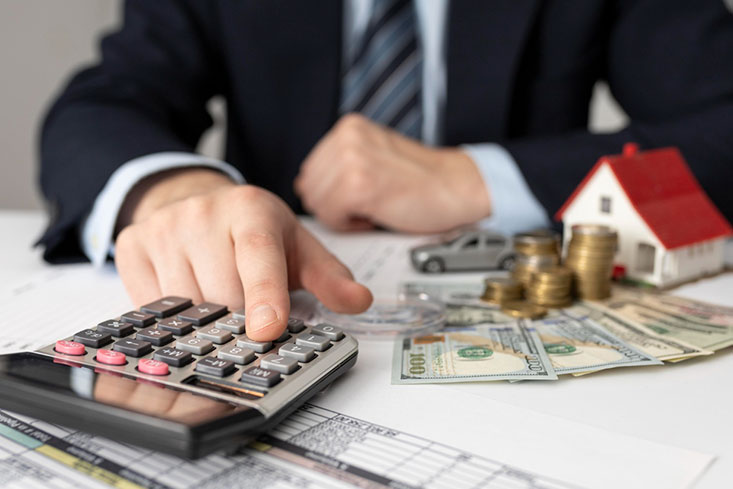Philadelphia Bankruptcy Lawyer
What is Consumer Bankruptcy?
Consumer Bankruptcy is a legal process to help individuals struggling with overwhelming consumer debt. It offers a way to restructure or eliminate debt and provide you with a fresh financial start.
When you file for bankruptcy, you enter into a legal agreement with your creditors. This agreement can help you:
Eliminate some or all of your debts
Create a manageable repayment plan
Stop creditor harassment
Protect your assets
Is filing Bankruptcy right for you?

There are several reasons why someone might consider bankruptcy:
- Overwhelming Debt: If you're struggling to keep up with your bills and face mounting debt, bankruptcy can provide relief.
- Creditor Harassment: Bankruptcy can stop creditors from harassing you with calls, letters, or legal actions.
- Foreclosure Sale of Your Home: Bankruptcy can stop the sale to give you time to enter into a repayment plan with your bank.
- Financial Fresh Start: Bankruptcy can give you a clean financial slate that will allow you to rebuild your credit and financial future.
- Protection of Assets: Bankruptcy can help protect your assets from creditors.

It’s important to note that bankruptcy is a serious decision with benefits and drawbacks. A free consulting with an experienced bankruptcy attorney in Philadelphia, PA can help you weigh the pros and cons and determine whether bankruptcy is the best option for you.
Types of Bankruptcy
Schedule your free consultation with one of our bankruptcy attorneys to find out whether a Chapter 7 or 13 bankruptcy filing is the best option for you.
Chapter 7 Bankruptcy
Allows you to retain assets and discharge many of your unsecured consumer debts, such as credit cards and hospital bills. It is normally applicable to those who have small earnings and little possessions.
Chapter 13 Bankruptcy
Allows you to retain assets while reformulating your consumer debts into a three-to-five-year payment plan. At the end of the payment plan, debt is either paid off or discharged.
Steps in Filing for Bankruptcy
While filing for bankruptcy protection is a complex process, it can provide you with a fresh start free of debt. Jefferson Law, LLC specializes and will guide you through the process to help you obtain a fresh start free of overwhelming debt. Filing for bankruptcy protection can be a daunting process, but with the right legal guidance, it can provide a fresh start and financial relief. At Jefferson Law, LLC, our bankruptcy attorney, Henry A. Jefferson, is committed to helping you navigate the complexities of filing bankruptcy and achieve a successful outcome. Contact us today for a free attorney consultation and learn more about how we can assist you.
Step 1: Contact a Bankruptcy Attorney
The first step is to call now for your free consultation with a qualified bankruptcy attorney. A Bankruptcy Specialist will provide you with a comprehensive evaluation of your financial situation and determine if bankruptcy is the right option for you. We will discuss the different types of bankruptcy filings (Chapter 7 and Chapter 13) and explain the potential benefits and drawbacks of each.
Step 2: Gather Financial Documents
To file for bankruptcy, you will need to gather a variety of financial documents. This may include:
- Income tax returns
- Pay stubs
- Bank statements
- Credit card statements
- Utility bills
- Property records
Step 3: Credit Counselling (Mandatory for Chapter 7 and 13)
If you are considering filing for Chapter 7 or Chapter 13 bankruptcy protection, you must complete online credit counselling and obtain a course certificate before filing, and online debt counselling and course certificate after filing. The process is quick, easy, and inexpensive. We will provide you with a debt counselling agency that we use regularly.
Step 4: File Bankruptcy Petition
Once you have gathered all the necessary documents and completed the first credit counselling course, we will file the bankruptcy petition and schedules with the bankruptcy court. The petition and schedules will include detailed information about your financial situation, including your income, expenses, assets, and liabilities.
Step 5: Attend Creditors' Meeting
After the bankruptcy petition and schedules are filed, you will be required to attend a meeting of the creditors. This meeting is an opportunity for your creditors to ask questions about your bankruptcy case. We will represent you at this meeting to ensure that your rights are protected.
Step 6: Develop a Repayment Plan (Chapter 13)
If you are filing for Chapter 13 bankruptcy protection, we will develop your repayment plan. This plan will outline how you will repay your debts over a three- to five-year period. We will work with you to create a plan that is feasible and sustainable.
Step 7: Obtain Discharge
After completing the bankruptcy process, you may be eligible for a discharge of your debts. This means that your creditors will no longer be able to collect those dischargeable debts listed in your bankruptcy filing. However, it is important to note that not all debts are dischargeable.
How does filing for Bankruptcy help you?
Bankruptcy can be of great advantage to those people facing financial hardships resulting from overwhelming debt. Nevertheless, as with any other decision, bankruptcy has advantages and disadvantages. We, as a qualified law firm can help you make all the necessary comparisons to determine the best choice.
Fresh Start
Bankruptcy eliminates or modifies your consumer debt.
Stop Creditor Harassment
Creditors are not allowed to communicate with you in any way after you file for bankruptcy protection.
Asset Protection
You can keep your stuff. You do not have to sell your home, car, and assets when filing for Chapter 7 and 13 bankruptcy protection.
Avoid Foreclosure Sale
A bankruptcy filing can stop the foreclosure sale of your home.
